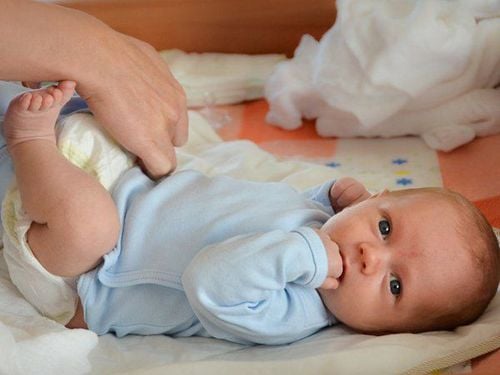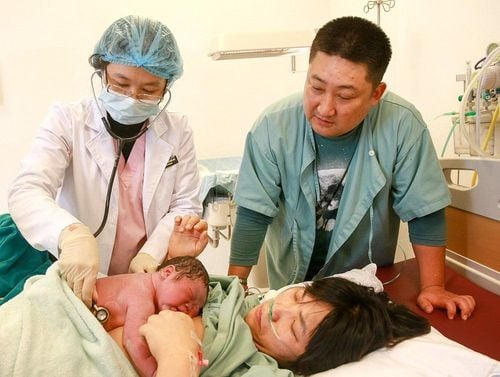This is an automatically translated article.
The article was professionally consulted by Specialist Doctor I Dang Thi Ngoc Chuong - Department of Pediatrics - Neonatology, Vinmec Central Park International General Hospital. He used to work at Children's Hospital I, Thu Duc Hospital and University of Medicine and Pharmacy Hospital in Ho Chi Minh City, with strengths in neonatal diagnosis and examination - neonatal resuscitation.The variety of colors and frequency of children's bowel movements always make mothers nervous and anxious every time they change their baby's diaper. 6-month-old children go outside to spray, lilac flowers ... is a normal phenomenon if the children's daily living and eating habits are not different.
1. Diarrhea in infants
Normally, children under 1 year old have an average of 2-3 bowel movements a day, the stool properties change in babies who are exclusively breastfed or fed formula milk due to different intestinal bacteria.
Breastfed babies' stools are usually yellow, viscous with a sour smell, slightly acidic. The stools of infants fed formula milk are usually yellow-brown like clay or green, have a rotten odor, have a neutral reaction, are more solid than breastfed babies' stools, sometimes molded, and the number of bowel movements is less than that of breastfed babies.
In a 2-month-old child who is exclusively breastfed, it is normal to have a lilac bowel movement 2-3 times a day, this phenomenon lasts until the baby is 3-4 months old.
For children who are breast-feeding, do not eat any other food but pass 5-7 times a day, sometimes there is water in their stools, lilac flowers, etc., but the child does not have a fever, sucks normally, and does not have rotten stools. Anyway, still normal. In this case, parents do not need to take their children to a doctor, get tested or take digestive enzymes. As children get older, their digestive tract will self-regulate.
Trắc nghiệm: Sự phát triển tinh thần, vận động của bé thế nào là đúng chuẩn?
Khi nào bé biết nói, biết hóng chuyện hay biết cầm cốc là "đúng chuẩn"? Điểm xem bạn biết được bao nhiêu mốc phát triển tinh thần, vận động "đúng chuẩn" của bé nhé!The following content is prepared under supervision of Thạc sĩ, Bác sĩ y khoa, Ma Văn Thấm , Nhi , Phòng khám Đa khoa Quốc tế Vinmec Dương Đông(Phú Quốc)
2. How does a 6-month-old baby defecate?
Each child has a different frequency of bowel movements, some children once a day, some children 3-4 times a day, some children 5-7 times, but if the child does not have a fever, eats normally, sleeps normally, and still gains weight, Parents are completely assured, no need for intervention, testing, taking digestive enzymes, but the child's digestive tract will gradually adjust itself. Because taking digestive enzymes, antibiotics or orange medicine as folk or used can still not reduce the number of bowel movements of children.Cauliflower stool is a small yellow lumpy stool that a child defecates on a background of green water. For babies who are still breastfed, it is common for the baby to have a lilac and broccoli stool. Or if the breastfed baby passes many times, the stools are lilac, with water and sometimes mucus, and then the baby still passes the yellow lilac but the water gradually turns mossy green, the stools have a slightly acidic smell. and the concentration is not a problem as long as the baby is normal, has no fever, eats well, sleeps well... it's fine. However, mothers can overcome this situation by adjusting the amount of breast milk to not cause discomfort in the baby's abdomen and help the baby not be overfed.

But if your child's defecation occurs with symptoms such as loose, watery stools that are yellow, green or brown, then it is likely that the child has diarrhea. Such a child may be due to an allergy or an infection that causes dehydration, the mother must rehydrate the child, provide all kinds of substances, breastfeed fully during the day and if the phenomenon is increasing. If it gets worse, you should take your child to the clinic immediately to see a doctor, to avoid the baby's case of acute diarrhea, which is very dangerous.
Parents can take their children to Vinmec International General Hospital, because this is one of the leading hospitals in the country for examination, diagnosis and treatment of digestive, urinary, and respiratory diseases. nutrition, especially in infants and young children. With modern equipment, sterile space, minimizing the impact as well as the risk of disease spread. Along with that is the dedication from the doctors with professional experience with pediatric patients, making the examination no longer a concern of the parents.
In addition, parents also need to supplement their children with essential micro-minerals such as zinc, lysine, chromium, selenium, vitamin B1, ... to fully meet the nutritional needs of children. The addition of these essential vitamins also supports digestion, enhances nutrient absorption, improves anorexia, and helps children eat well. Parents can simultaneously apply dietary supplements and functional foods derived from nature for easy absorption. The most important thing is that improving your baby's symptoms often takes a long time. Combining many types of functional foods at the same time or changing many types in a short time can make the baby's digestive system unable to adapt and completely not good. Therefore, parents must be really patient with their children and regularly visit the website vimec.com to update useful baby care information.















